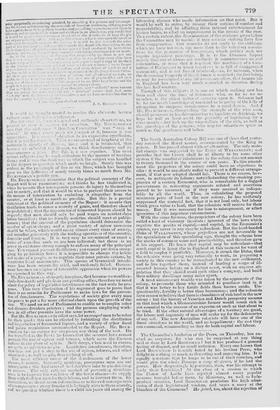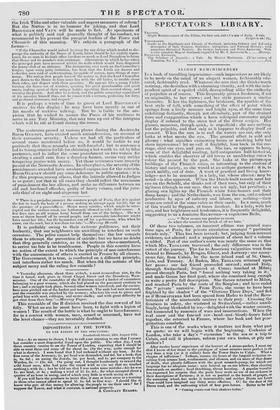The Chancellor's laudation of the Peers, on Thursday, has ex-
cited no surprise; for who can be surprised at any thing said or done by Lord Bstououssi ? but it has produced a general feeling of disgust, and no small irritation. Every one knows that Lord BROUGHAM is heartily hated by his brother Peers, who delight in nothing so much as thwarting and annoying him. It is equally notorious that he longs to be out of their clutches, and would give the whole Peerage a cosy de grace, if he had the power. How disgustingly hypocritical, then, was his attempt to toady their Lerdshies! At the close of a session in which the House of Lords have rejected almost every popular measure brought before them, by Ministers, as well as Inde- pendent senators, Lord Baounnam proclaims his high admi- ration of their legislatorial wisdom, and vents a sneer at the blunders of the Commons! He joked, too, about the rejection of the Irish Tithe and other valuable and urgent measures of reform ! But the Nation is in no humour for joking, and that Lord BROUGHAM and VA ITX will be made to feel. As specimens of what is publicly said and generally thought of his conduct, we recommend to his perusal the pungent leaders of the Times and Chronicle of this morning. We subjoin a paragraph of the former- " If the Chancellor would indeed be sorry for any thing which tended to dis- parage the authority of the house of Lords, bitter should be his nightly repen- tance, for no man in his high office has done so much as Lord Brougham to bring that house and its members into contempt. Altercations in which he has taken the principal part have occurred within its walls which would have disgraced the penny. club of au alehouse. The insinuation, ever ready on the Chancellor's tongue, upon every petty irritation, has been that the Lords are duaces and imbeciles, men void of understanding, incapable of reason, mere things of cere- mony. The notion that people have of the matter is, that the Lord Chancellor goes down to the house to have some fun with the old ladies, to tumble about their robes, and disport with their gravities. Ile appears like a young Fickle turning the house out of window, quizzing his great grandmother and great aunts, making sport of their antique habits, upsetting their revered china, and roasting the parrot. And after he is tired, and the public somewhat scandalized at his amusing himself thus, out he comes with a sermon, professing his duty, and profound reverence, and respect."
It is perhaps a waste of time to guess at Lord BROUGHAM'S motives for this display : he may have been merely in one of his moods of reckless talking. But he is liable to the sus- picion that he wished to assure the Peers of his readiness to serve in any Tory Ministry, that may turn up out of the intrigues which will be rife at Court during the recess.
The sentences passed at various places during the Assizes,by Baron GURNEY, have excited much animadversion, on account of their excessive severity. Unless we had all the particulars of several cases mentioned before us, it would be unfair to say positively that these remarks are well-founded; but to sentence a lad to transportation forlife for obtaining a bat worth Sc. 6d. by false pretences, and to inflict the same punishment on two women for stealing a small sum from a drunken farmer, seems very unlike tempering justice with mercy. ' Yet these sentences were recently passed at the Newcastle Assizes. In other places, the severity of the punishments awarded have awakened compassion for the convicts. Baron GURNEY should pay some deference to public opinion : it is for this purpose, among others, that the latitude allowed to Judges is so great; not that in all cases they should inflict the maximum of punishment the law allows, and make no difference between an old and burdened offender, guilty of heavy crimes, and the juve- nile thief of an eight-and-sixpenny hat.



















 Previous page
Previous page